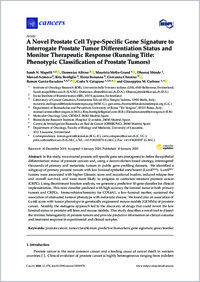A novel prostate cell type-specific gene signature to interrogate prostate tumor differentiation status and monitor therapeutic response (running title: Phenotypic classification of prostate tumors)
- Mapelli, Sarah N. Institute of Oncology Research (IOR), Faculty of Biomedical Sciences, Università della Svizzera italiana, Switzerland - Swiss Institute of Bioinformatics (SIB), Lausanne, Switzerland
- Albino, Domenico Institute of Oncology Research (IOR), Faculty of Biomedical Sciences, Università della Svizzera italiana, Switzerland
- Mello-Grand, Maurizia Laboratory of Cancer Genomics, Fondazione Edo ed Elvo Tempia Valenta, Biella, Italy
- Shinde, Dheeraj Institute of Oncology Research (IOR), Faculty of Biomedical Sciences, Università della Svizzera italiana, Switzerland
- Scimeca, Manuel Department of Biomedicine and Prevention, University of Rome “Tor Vergata”, Rome, Italy
- Bonfiglio, Rita Department of Biomedicine and Prevention, University of Rome “Tor Vergata”, Rome, Italy
- Bonanno, Elena Department of Biomedicine and Prevention, University of Rome “Tor Vergata”, Rome, Italy
- Chiorino, Giovanna Laboratory of Cancer Genomics, Fondazione Edo ed Elvo Tempia Valenta, Biella, Italy
- Garcia-Escudero, Ramon Molecular Oncology Unit, CIEMAT, Madrid, Spain - Biomedicine Research Institute, Hospital 12 octubre, Madrid, Spain
- Catapano, Carlo V. Institute of Oncology Research (IOR), Faculty of Biomedical Sciences, Università della Svizzera italiana, Switzerland - Swiss Institute of Bioinformatics (SIB), Lausanne, Switzerland - Department of Oncology, Faculty of Biology and Medicine, University of Lausanne, 1011 Lausanne, Switzerland
- Carbone, Giuseppina M. Institute of Oncology Research (IOR), Faculty of Biomedical Sciences, Università della Svizzera italiana, Switzerland
-
10.01.2020
Published in:
- Cancers. - 2020, vol. 12, no. 1, p. 23 p
English
In this study, we extracted prostate cell-specific gene sets (metagenes) to define the epithelial differentiation status of prostate cancers and, using a deconvolution-based strategy, interrogated thousands of primary and metastatic tumors in public gene profiling datasets. We identified a subgroup of primary prostate tumors with low luminal epithelial enrichment (LumElow). LumElow tumors were associated with higher Gleason score and mutational burden, reduced relapse-free and overall survival, and were more likely to progress to castration-resistant prostate cancer (CRPC). Using discriminant function analysis, we generate a predictive 10-gene classifier for clinical implementation. This mini-classifier predicted with high accuracy the luminal status in both primary tumors and CRPCs. Immunohistochemistry for COL4A1, a low- luminal marker, sustained the association of attenuated luminal phenotype with metastatic disease. We found also an association of LumE score with tumor phenotype in genetically engineered mouse models (GEMMs) of prostate cancer. Notably, the metagene approach led to the discovery of drugs that could revert the low luminal status in prostate cell lines and mouse models. This study describes a novel tool to dissect the intrinsic heterogeneity of prostate tumors and provide predictive information on clinical outcome and treatment response in experimental and clinical samples.
- Language
-
- English
- Classification
- Medicine
- License
- Open access status
- gold
- Identifiers
-
- RERO DOC 327938
- DOI 10.3390/cancers12010176
- ARK ark:/12658/srd1318921
- Persistent URL
- https://n2t.net/ark:/12658/srd1318921
Statistics
Document views: 199
File downloads:
- Fulltext: 193
